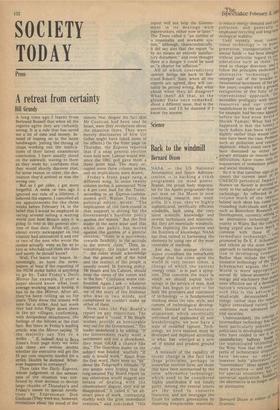Science
Back to the windmill
Bernard Dixon
NASA — the US National Aeronautics and Space Administration — is backing a crash programme on wind power. Repeat, the proud body responsible for the Apollo programme that put men on the Moon is now conducting research into windmills. It's true, they're highly sophisticated, terrifically efficient windmills, built using the verylatest scientific knowledge and newest techniques and materials. But they are essentially windmills. From exploring the universe and the frontiers of knowledge, NASA has thus turned to harnessing the elements by using one of the most venerable of methods.
For me, this strange circumstance crystallises the remarkable change that has come upon the world in very recent times, a change of which the current 'energy crisis ' is in part a symptom. This concerns the ways in which we should exploit technology in the service of man. And what has begun to alter — for both the providers and customers of technology — is fundamental thinking about the rate, style, and content of technological development. Instead of technocratic utopianism, which uncritically welcomed and applauded all new breakthroughs, we now have a state of modified rapture. Technology, we h4ve realised, must be developed and deployed according to what has emerged as a new set of sound and prudent ground rules.
A measure of the rapidity of recent change is the fact that these principles, perhaps in somewhat extreme form, are those that have been summarised by the term alternative technology, which used to be considered highly unorthodox if not totally outty. Among the central tenets are the need to conserve resources, and not mortgage the future for unborn generations by depleting irreplaceable materials,
,The
Spectator February 2, 1974 to reduce energy demand and curb pollution, and generally te ecological l srteacbyicliltiyng and long-tern' Until recently, most convoy tional technology — in poWe,1 generation, transportation, a11,1 similar fields — has been designs' without particular regard to ctle; siderations such as these. Tu.', need to change direction, and follow the principles enshrined alternative technology Ilas emerged out of the broader vironmental movement of the Pas,t few years, coupled with a growt recognition of the folly of conventional approach. u:d incredible profligacy with lirnit`i resources and our crimina wfbarsetexfaumlnbeless binadthbeecuosme eofapepnaf errelti before we had even heard , Sheikh Yamani. What has 111 happened is that the lunacY such habits has been expose slightly earlier than would other; wise have been the case. Problerne such as pollution and resource depletion, which could once v been dismissed as either porary irritants or remote fote difficulties, have come into mainstream of immediate political and social thinking. So it is that (another sign of t,e times) the current issue ofol UNESCO periodical imPact Science on Society is devotedep. „e tirely to the subject of alternutii;if technology. As reflected is volume much of the im1),-pi behind such ideas has come 'rs'n5 crusading individuals and gr°110;11 such as Biotechnic Research Danevealloteprmneantitv,ecutrercenbtnlbylosgetytinSon575, munity in Wales. But the concerig being urged also have Much„.0. common with those a '• g termediate technology," 1°i,ner promoted by Dr E. F. Schurnac."bie and others as the most serlsia, approach to technological in11°.;5. tion in developing countr:,""el. Rather than imitate the caRfst, intensive technology of the w,e;rd Schumacher argues, the TH:ic World is more appropriat`4 served by labour-intensive teir'e5 nology and machinery that 01g more effective use of a develoPied nation's resources. Assooi°4, c i with this is the advocaY "Jr small-scale, decentralised te.cs,e, nology, rather than the masst,licli highly centralised variety W`;'105, underpins most advanced io" intermediate Und erstandtaebelbyn, otlhnegycobnasceriPwetvi teciliff trial societies. been particularly popular tries politicians in developing court' 30 who have tended to see it as to unsatisfactory halfway hous of the sophisticated technoloParid the West. Now that the cots i501 perils of technocratic utoPetit, have become so aPP3,,r and however, both "alternativeocll "intermediate" ideas apPeart onlY more attractive — and rio`,. for for special situations, b,i1;enlYi universal application. Sou'erelY
an is no longer n rn Bernard Dixon is editor Scientist.


































 Previous page
Previous page